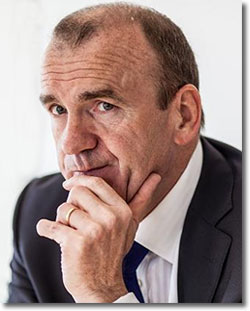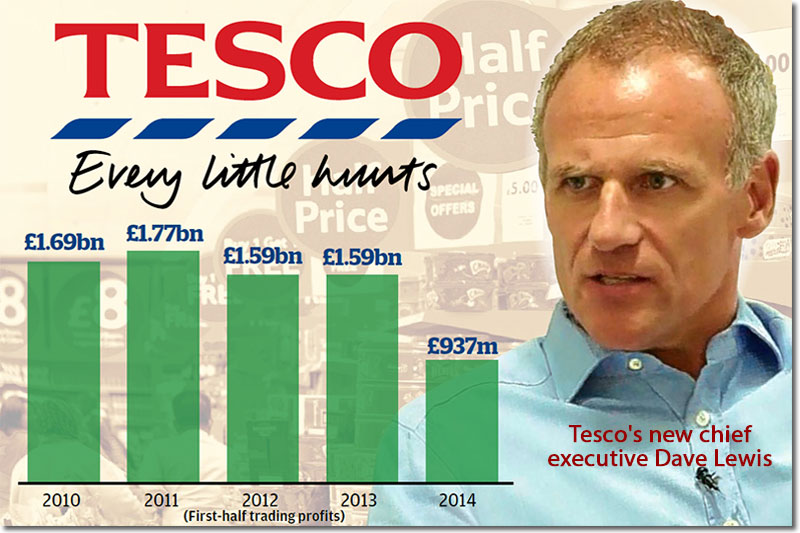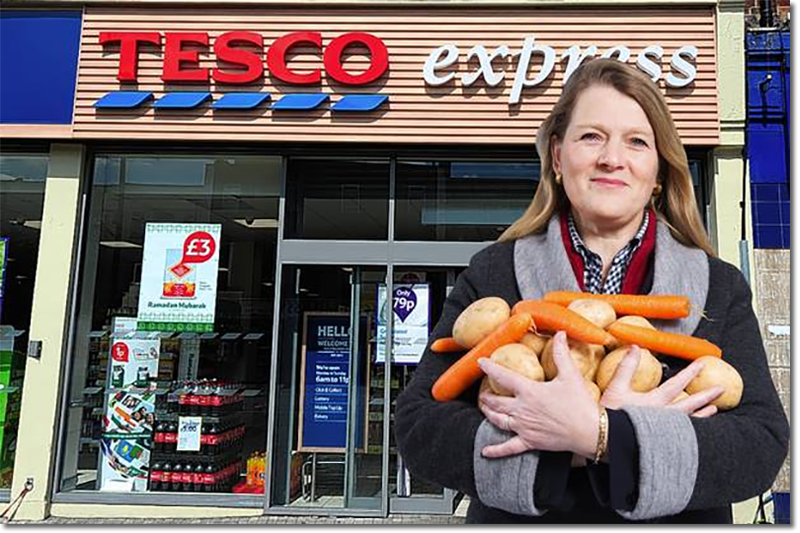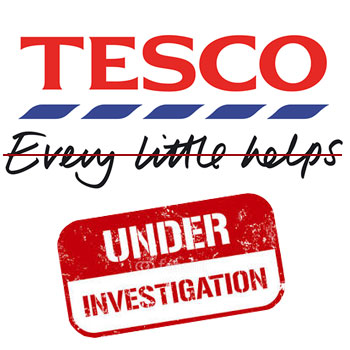Where Tesco Went Wrong With Its Suppliers

The UK Federation of Small Businesses has backed the Groceries Code Adjudicator’s probe into Tesco Plc’s relationship with its suppliers.
Former chief executive Sir Terry Leahy told the BBC that Tesco allowed the trust of its millions of customers to be “eroded”, that it lost its reputation for having low prices and that there was a “failure” of leadership under Philip Clarke.
He also said that too many senior executives were pushed out of the business which also suffered a culture change which was “not for the better”.
We also discovered:
- a major fallout between Tesco and one of its biggest suppliers, L’Oreal, which led the French cosmetics giant to threaten legal action after a disputed payment of about £1m demanded by Tesco
- that the former chief financial officer, Laurie McIlwee, sent an internal email in 2012 warning about financial controls at the retailer after a problem was discovered in its Polish business. The email told finance staff: “You should be in no doubt as to the seriousness [of] mis-declarations” and said that accounting for profits early was forbidden “where they cannhttp://en.wikipedia.org/wiki/Dave_Lewis_%28businessman%29ot be justified”. The early accounting of profits appears to be at the heart of the Serious Fraud Office investigation into Tesco’s £263m mis-statement of its forecasted profits which it revealed last autumn. In 2012, the finance department caught the issue before it was reported externally, but the behaviour still appears to have continued in other parts of the business
- that the Groceries Code Adjudicator, charged with policing the relationship between retailers and suppliers, has yet to be given powers to fine supermarkets up to 1% of their UK revenue for supplier mistreatment, despite requesting the ability to do so more than a year ago. Vince Cable, the Business Secretary, said that he backed the fines and accused the Treasury of “sitting” on the issue.

And in his first public statement since leaving the retailer abruptly in June last year, Philip Clarke said that he needed to change the business when he became chief executive in 2011 because of issues “that had been building for some time”.
He said his new strategy for a “multi-channel” Tesco had the full backing of the board and was the right direction for the supermarket.
Below, we’ve mapped out the four key areas of the investigation and in particular Sir Terry’s thoughts on where Tesco’s problems lie.
Sir Terry: Where Tesco Went Wrong
Sir Terry was the man widely credited with building Tesco into one of the world’s largest and most successful retailers.
He presided over 14 years of growth in profits and sales and has largely kept his counsel on Tesco’s problems.
In his interview with me, he dealt with critics who said that he ran the business “too hot” (to use Philip Clarke’s phrase) and maintained profits through the recession by savings on costs and not investing in the stores.
“The acid test is, are you attracting customers?” Sir Terry said.
“Yes we were, more customers each year. Were sales growing? Yes they were.
“Customers don’t wait around to pass judgement in a market like retailing. They pass judgement every day and if you’re doing something wrong, they’ll shop elsewhere.
“But they were coming to Tesco, so that’s the best indication that the business was set up right for the recession and actually for the months and years ahead.
“It would be a mistake to look back for the reasons [for the problems at Tesco].
“Customers are sending a message today that there’s something not right in the stores and the business mustn’t ignore that, because actually if they listen to that message, they can put it right and the good news is, it won’t take four years for customers to respond, they’ll be back in the next day if they start to do the right thing.”
The Big Four

There is already some evidence of that. The arrival of the new chief executive, Dave Lewis, last autumn has led to the arrest of some of Tesco’s decline.
Sir Terry said that one of the most vital things with any retailer was gaining the trust of your customers. And that meant providing low prices.
Losing that reputation was very damaging for Tesco, he said.
Asda is now 6% cheaper than Tesco, according to research by retail analysts Sanford Bernstein published in December.
“It’s very damaging,” Sir Terry responded when I asked him about Tesco ceding price ground to Asda.
“Tesco is the biggest, people expect it to have the best prices and know they can trust Tesco to deliver that and not have to shop around and check that they’re getting the best deal.
“I think that some of that trust has been eroded, which has meant that people have shopped around.”
‘Niche Players’
On the growth of the discounters Aldi and Lidl, Sir Terry said they were still “niche players”. He argued that the Big Four should not blindly chase them on price, but had to become used to a “new type of competition”.
Sir Terry said the major retailers should provide straightforward low prices rather than short-term promotions, which many argue have left customers confused.

As profits and sales fell, Tesco has been accused of ramping up the number of promotions it ran.
The reason? Each promotion would bring a payment from suppliers - called commercial income - which would help support Tesco’s balance sheet.
So the more promotions, the more commercial income there would be.
“What [customers] really needed were lower prices and they needed a price list that they could trust,” Sir Terry said.
“What they got instead, not just from Tesco, but from all of the supermarkets, was too much reliance on short-term promotions.”
Source: BBC
Tesco Faces Investigation over Treatment of Suppliers
Groceries code adjudicator Christine Tacon has launched an investigation into Tesco’s behaviour towards suppliers. And this could be extended to other retailers if evidence of malpractice comes to light.

In September last year, Tacon called on the company to examine its behaviour towards suppliers as part of the internal review which it launched into its profit over-statement.
Tacon said she had “formed a reasonable suspicion that the retailer has breached the Groceries Supply Code of Practice” after considering information submitted to her relating to practices associated with the profit over-statement.
She said that she had discussed the practices with Tesco and now needed more information from direct suppliers and others to determine what further action to take.
The investigation is expected to take up to nine months. Tacon wants evidence to be submitted by 3rd April.
It will cover the conduct of Tesco plc from 25 June 2013 (when the GCA was created) to 5 February 2015 and focus two areas of the code.
It will examine practices which have resulted in delay in payments to suppliers, including:
- Short deliveries, including imposition of penalties
- Consumer complaints where the amounts were not agreed
- Invoicing discrepancies such as duplicate invoicing where two invoices were issued for the same product
- Deductions for unknown or un-agreed items
- Deductions for promotional fixed costs (gate fees) that were incorrect
- Deductions in relation to historic promotions which had not been agreed.
The investigation will also consider the existence and extent of practices where suppliers have been required to make payments for better shelf positioning which are not related to a promotion.
Although the investigation will focus on Tesco, Tacon has not ruled out extending it to other retailers if she find evidence of malpractice.
Christine Tacon said: “I have applied the GCA published prioritisation principles to each of the practices under consideration and have evidence that they were not isolated incidents, each involving a number of suppliers and significant sums of money.”
David Noble, group chief executive of the Chartered Institute of Procurement & Supply, welcomed the investigation but said it was overdue.
“Unchecked retailers have felt free to abuse their power for far too long and suppliers across the UK are owed billions of pounds in unpaid invoices.
“If there has indeed been wrong-doing by Tesco, the regulator must have the teeth to force change. But this remedial action is tantamount to closing the stable door once the horse has bolted. For too long the retail sector has felt able to operate according to its own norms and practices without regard for best practice in procurement and supply chain management. To really sort out this mess at source, there needs to be clear accountability and higher standards within the retail procurement industry as a whole.
“Regulatory action or no, if the UK’s retail supply chains are run without the right people in place and for the sole purpose of reducing costs and squeezing suppliers, it will only be a matter of time until the next scandal comes to light. We must take this opportunity to change course now.”
Source: BBC
Related: Tesco Launches Social Network to Increase Collaboration with Suppliers

Download the Report: The Sourcing Hub and Upstream Supplier Networks
Article Topics
College of Business at Illinois News & Resources
Where Tesco Went Wrong With Its Suppliers The Sourcing Hub and Upstream Supplier Networks ‘Organizational Forgetting’ Erodes Quality Gains in Supply Chains Does Organizational Forgetting Affect Vendor Quality Performance? An Empirical Investigation ‘Sourcing Hub’ Could Help Create a More Efficient Supply Chain Managing Value in Supply Chain - Case Studies on the Sourcing Hub ConceptLatest in Supply Chain
Let’s Spend Five Minutes Talking About ... Malaysia Baltimore Bridge Collapse: Impact on Freight Navigating TIm Cook Says Apple Plans to Increase Investments in Vietnam Amazon Logistics’ Growth Shakes Up Shipping Industry in 2023 Spotlight Startup: Cart.com is Reimagining Logistics Walmart and Swisslog Expand Partnership with New Texas Facility Nissan Channels Tesla With Its Latest Manufacturing Process More Supply Chain













